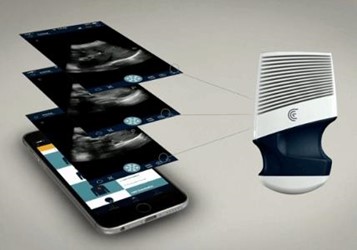Clarius' Pocket-Sized, Wireless Ultrasound Scanner Cleared By FDA

Clarius Mobile Health — a Canada-based digital healthcare company — announced that FDA has cleared its handheld, wireless ultrasound scanner, suitable for quick, point-of-care (POC) scans and short procedure guidance. The device connects via app to most consumer Android and Apple smart devices, and is as “easy to use as a mobile phone camera,” according to Clarius CEO Laurent Pelissier.
The Clarius C3 and C7 scanners are completely wireless and are powered by a rechargeable battery pack instead of draining power from a connected smart device. Images are transmitted to the clinician’s smart devices, where they can be reviewed or shared on a cloud-based platform. The C3 scanner was designed to image the abdomen and lungs, and a virtual phased array allows for quick cardiac scans. The C7 guides short procedures and is capable of superficial imaging. The magnesium casing is durable and water-submersible for easy cleaning and disinfection.
Pelssier called the FDA clearance a “significant milestone” for his company.
“Physicians have been asking for a portable ultrasound system that works with their iPhone for some time,” he said when the scanners were introduced at the American Institute of Ultrasound in Medicine in March. “The challenge has been to make an affordable device that is small enough to carry around that also produces great images.”
Pelssier noted that bedside ultrasound cost-prohibitive for many healthcare providers, and individual compact systems cost between $25,000 and $70,000. Clarius Mobile intends to market its devices for a fraction of that cost, offering several scanners for the price of one.
“Clarius is the future of patient care. The image quality is amazing for any scanner, much less one that fits in my pocket,” said Steven Steinhubl, director of digital medicine at Scripps Translational Science Institute, in a recent press release.
Representatives from Clarius Mobile recently hosted a demonstration of the scanners at the Radiological Society of North America (RSNA) meeting. Kevin Irish, an interventional radiologist who was part of the scanners’ development process, noted that the system would be “ideal for pain management and limited interventional procedures, such as line placements, thoracenteses, paracenteses and biopsies.”
Analysts from iData, Kamran Zamanian and Lucas Parker, noted in a recent guest column that point-of-care ultrasound represented the fasted growing segment in the ultrasound market in 2014, a trend they expect to continue for the next decade. Many top medtech companies, such as Philips and GE, are developing products for this market, and OEMs are looking to differentiate in a “crowded” market space.
